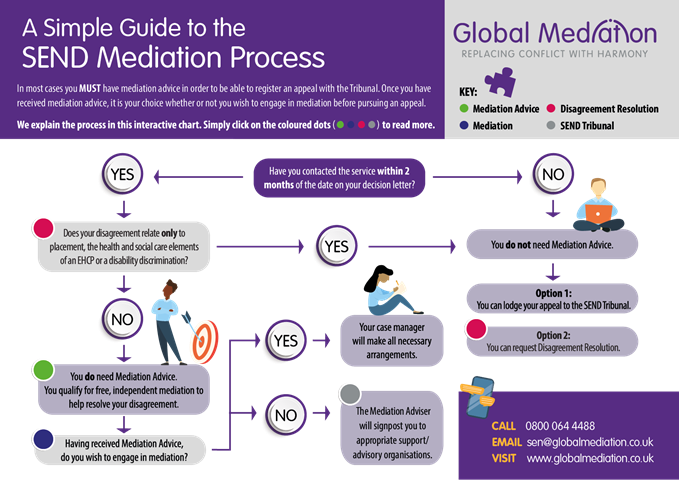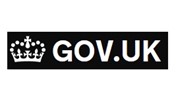The EHCP Team can be contacted via a dedicated email address.
- Local Offer Home
- Information and Advice
- Education, Health and Care Plans (EHCP's)
EHCP disagreements, tribunals and appeals
The council work hard to include young people's & parents/carers ideas and views in a plan and give opportunities for changes to be made. When a new or Amended EHCP is produced, an opportunity is always provided to consider changes. The LA will send out a Draft EHCP (for new assessments) or a Amended Draft (for existing EHCP's). This is your opportunity to comment on what is in the plan and suggest changes.
Should you have concerns about an EHCP, The EHCP Team can be contacted on 01484 456888 or EHCP.Team@kirklees.gov.uk
Once EHCP is finalised, if you (or the young people when over 16) don't agree, you can appeal about what it says in an EHCP.
The initial step that parents, cares or young people can go through is a process called mediation. This is a carefully managed conversation with parents, carers, the council and other professionals to discuss the disagreement and try to resolve it. This is run by another professional called a mediator who helps to keep the conversation on track.
If you are still not happy with the decision made at mediation, then an appeal can be made to the tribunal. This is more formal process where the disagreement is presented to a tribunal judge to make a decision, however the council will work hard to reach an agreement before it gets to the point of needing the judge to make a decision.
How do I raise an appeal?
When Kirklees send details of a FINAL EHCP or a request for an EHC Needs Assessment (EHCNA), there will be details included about how to appeal any decisions that have been made.
The first stage of an appeal is Mediation, in Kirklees this is done by a company called Global Mediation.
More information about Community Accord can be found on their website (opens in new window).
You can contact Global Mediation on 0800 064 4488 or email sen@globalmediation.co.uk
You can find more information, including the forms required to raise an appeal on the Gov.uk webpage about EHCP appeals (Opens link in new window)
More information about appeals and tribunals can be found below.
You can also find more information on the Local Offer Complaints and Disagreements page.
Disagreement Resolution - When nothing else has helped.
Sometimes it can be really hard to reach an agreement even if you have tried to speak with those who made the decision and have sought support from KIAS and other support groups.
If this happens, Disagreement Resolution may be the best next step.
This is for any child or young person with SEND, this is not just for those with an EHCP.
Disagreement Resolution means that an independent person will talk to all those involved in the disagreement to try and help them reach a solution.
In Kirklees we use a company called Global Mediation to carry out this work. They are an independent service who specialise in mediation and disagreement resolution by helping people to find good solutions to complicated problems.

More information about Community Accord can be found on their website (opens in new window).
You can contact Global Mediation on 0800 064 4488 or email sen@globalmediation.co.uk
The graphic below explains the mediation process:

If you are unhappy with a decision not to issue an EHC plan, or with the special educational content or placement in the plan, you can make an appeal to the SEND Tribunal. You are also able to request recommendations about the health and social care content of the plan at the same time, provided there is also an education element. This will mean the Tribunal will take a more holistic, person-centred view of the needs of the child or young person.
This does not prevent you also complaining about other aspects of your disagreement through other complaint procedures. You should seek advice about the different routes available, including from your local Information Advice and Support Service (IASS).
If the SEND Tribunal makes a recommendation about health or social care elements of an EHC plan, this is non-binding. The local authority and/or health commissioner is generally expected to follow such recommendations, but they are not legally binding. Where they are not followed, the reasons for not following them must be explained and set-out in writing to you and to the Department for Education through the evaluators. If they are not followed, you can complain to the Local Government and Social Care Ombudsman (LGSCO) or Parliamentary and Health Service Ombudsman (PHSO) or seek to have the decision judicially reviewed. Further information on the roles of these bodies can be found on their websites.
You can request the Tribunal makes recommendations about the health and/or social care aspects of EHC plans as part of an appeal relating to:
- the description of the child/young person’s special educational needs in an EHC
plan
- the special educational provision specified in an EHC plan
- the school or other educational institution named in an EHC plan
- a decision by the local authority not to issue an EHC plan
- a decision by the local authority not to carry out a re-assessment for a child/young
person who has an EHC plan
- a decision by the local authority not to amend an EHC plan following a review or
re-assessment
- a decision by the local authority to cease to maintain an EHC plan
The SEND Tribunal extended powers places responsibility on local authority SEND teams to:
- Inform parents and young people of their new rights through decision letters and the local offer
- Provide evidence to the Tribunal from the health and social care bodies in response to any issues raised within the timeframe set by the Tribunal, seeking permission to bring additional witnesses to the hearing as necessary
It also places responsibility on health and social care commissioners to:
- Respond to any request for information and evidence within the timeframe set by the Tribunal
- Send a witness to attend the hearing as required
- Respond to the parent/young person and the LA SEND team within 5 weeks of a recommendation being made, setting out the steps they have decided to take or giving reasons why they are not going to follow the recommendation.
How can a parent or young person request a health or social care recommendation?
If you wish to appeal against a local authority decision on any of the grounds above and want to request that the Tribunal considers your concerns about the health and /or social care aspects of the EHC plan, you should follow the process for bringing an appeal to the Tribunal and tick the box on the form relating to a health and/or social care appeal. Advice on making SEND appeals to the Tribunal and the appeal form is available on the GOV.UK website (opens link in new window).
Before you can register an appeal with the Tribunal, you must contact a mediation adviser within two months of the LA decision you wish to appeal and consider whether mediation might be a way to resolve your disagreement with the LA.
If you want to appeal only about the school or other institution named in the EHC plan you do not have to contact a mediation adviser.
You can go to mediation about the health and social care elements of an EHC plan, but this is not compulsory. You can request recommendations about health and social care issues without having to receive mediation advice or attend mediation about those issues, provided there is also an education issue about which you are appealing.
Once a mediation adviser has been contacted, or once you have taken part in mediation, you will be issued with a certificate. This will be necessary if you are still unhappy and wish to progress to an appeal with the Tribunal. An appeal to the Tribunal must usually be made within two months of the decision about which the appeal is being made or one month following the issuing of the mediation certificate, whichever is the later.
If mediation resolves the educational issues, you will not be able to appeal to the Tribunal on any health and/or social care aspects of the EHC plan. However, mediation provides an opportunity for us to resolve disagreements and it can be completed more quickly than an appeal. It does not affect your right to make an educational appeal, and some aspects of the disagreement can go to appeal even when other aspects are resolved.
Help and further information
en-GBLast updated: 22/12/2021


